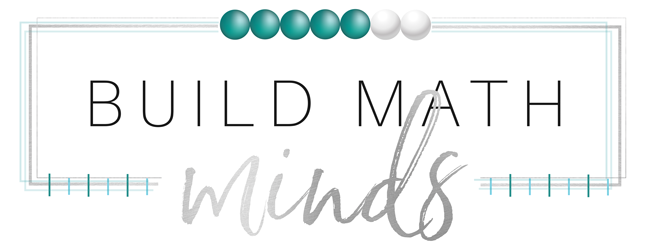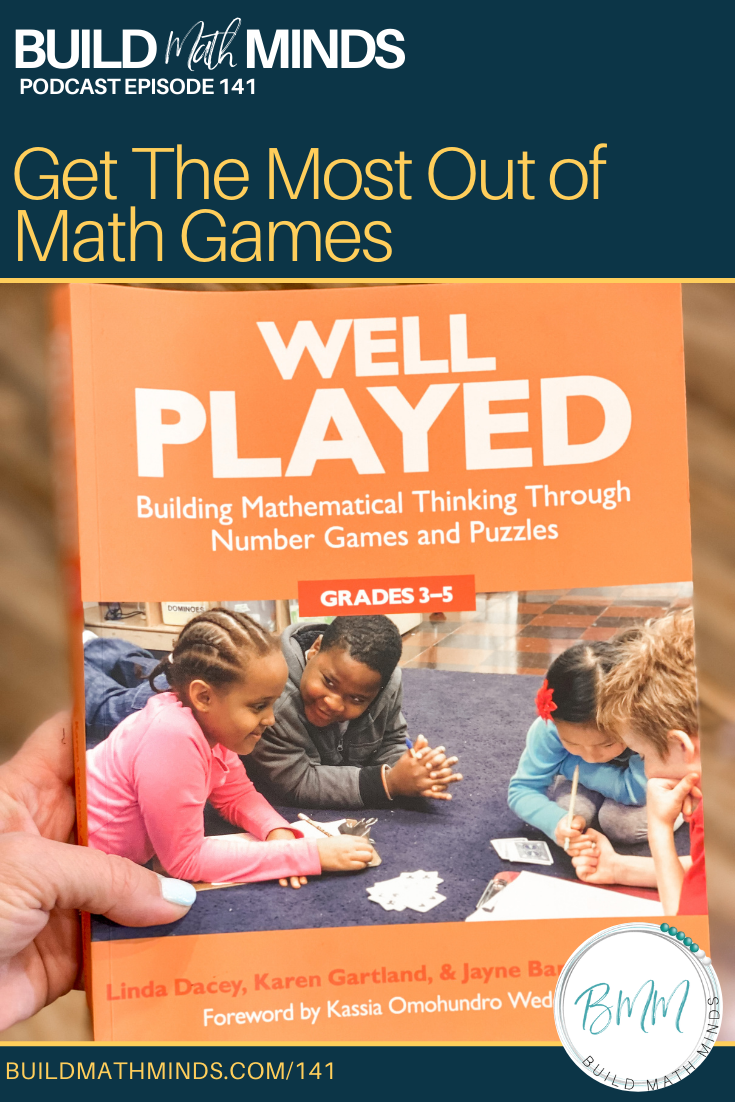Resources mentioned in this episode:
Well Played K-2 book
Well Played 3-5 book
Well Played 6-8 book
Member login for Build Math Minds PD site (Linda’s session is in the 2017 Virtual Math Summit area)
Join the Build Math Minds PD site
Welcome fellow Recovering Traditionalists to Episode 141. Today I’d like to share a tip for a way to Get The Most Out of Math Games.
Playing games in math is fun, but they can also be very powerful mathematically.
If I ever designed a curriculum, it would include 3 things:
Number Talks
Story Problems
Games
Games are one of my favorite ways to have kids practice. They can do 50 problems in 5 minutes and not even realize it.
A favorite book of mine about games is Well Played: Building Mathematical Thinking Through Number Games and Puzzles by Linda Dacey, Karen Gartland, and Jayne Bamford Lynch. There is a K-2, 3-5, and 6-8 version of the book that I’ll link up over at buildmathminds.com/141
I talked about the book back on episode 34 of this podcast, but I found something while reading back through the book today that I wanted to share with you. It’s a quick tip to help you get a bit more out of the use of games in your classroom. I found it on page 15 of the Grades 3-5 book.
“At the end of the day, a teacher may have a pile of recording sheets and wonder what to do with them. Students often do not receive feedback about such work and often regard recording sheets as just a place to ‘do their math’ while they are playing the game. One teacher told us, ‘I like to respond to the recording sheets occasionally, so students know these are more than scrap paper and that they are expected to always show their best thinking.’ We agree. When teachers provide feedback, students value the recording sheet more; they view it as a tool for communicating their thinking and demonstrating what they know.”
One of the biggest complaints I hear about using games in the classroom is that teachers don’t know what the kids are actually doing while playing the game. Are they doing the math or just goofing around?? They want kids to have fun but also need to make sure there is some accountability built in. I thought this idea presented in the book is an excellent way to do that.
Collecting their recording sheets allows you to not only see that they were doing the math, but can often provide you insights into your students’ thinking and give you ideas on what may still need to be addressed with them.
As always, any book I share here on the podcast is one that I recommend. This series of books not only gives you things to think about when implementing games, but is full of games that you can use in your classroom.
If you are a member of the Build Math Minds PD site, one of the authors, Linda Dacey did a session for us about Unleashing the Power of Games and Puzzles. So if you are a member of the BMM site, login and go to the 2017 Virtual Math Summit area to watch that session. If you aren’t a member, come join! Go to buildmathminds.com/bmm to become a member!
Now, as much as I love games, one of the troubles everyone has with games is the time it takes to make games and to teach the kids the rules of the games. So a few years back I created what I called Evergreen Games. They are 5 games that once you teach kids how to play, you can switch out the content and you don’t have to teach the rules of the game because they already know them.
Now I didn’t create the games, I just compiled them. They are games that have been around for awhile. For example, one of the games is Memory, the matching game. Once you teach kids how to play Memory you can switch out the game pieces to be different kinds of matches.
I have a free download of the 5 games. In the download you get 19 games that are pre-made for you. Some use whole numbers, some are focused on building number sense, some are fractions, and some are focused on practicing multiplication. You get to see lots of different ways to use the games. Plus, you can make a copy of the file so that you can use those as a template and modify the games to be whatever content you want.
You can go to buildmathminds.com/games to request the download of them. I’ll also link that over at buildmathminds.com/141 where we link everything from the episode, including the Well Played books.
Until next week my Fellow Recovering Traditionalists, keep Building Math Minds.
This episode is brought to you by the Build Math Minds professional development site. It’s an online site full of PD videos designed specifically for elementary teachers to help you build your math mind so you can build the math minds of your students. If you are interested in getting in-depth Math PD at Your Fingertips, become a member of Build Math Minds. Just go to buildmathminds.com/bmm and depending upon when you are listening to this, enrollment might be open or you can join the waitlist and get notified when it opens again.





I found the Well-Played book on your BMM website 2 years ago when I bought a membership over the summer and watched a video by one of the authors. It has been an important part of my math class ever since! I love the games and feel like I’m really teaching a lesson when I do one. Each of these activities can be a whole math class then can be played again for homework or at school. Thank you for introducing this!